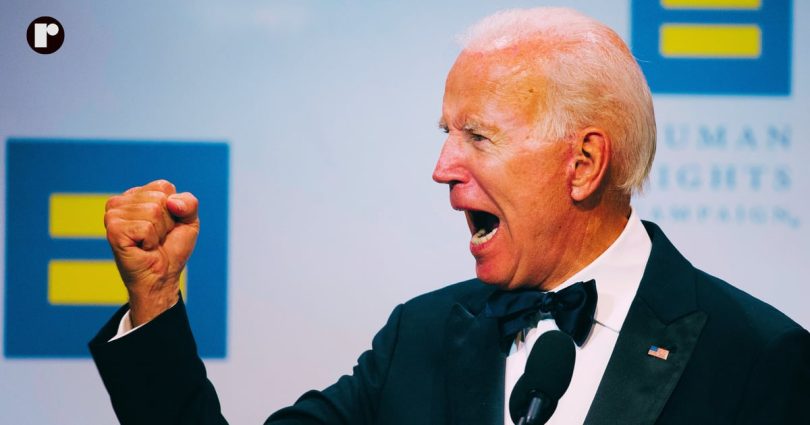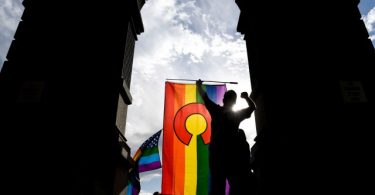Many LGBTQ adults are feeling dissuaded from the Democratic party in lieu of this year’s election, according to a recent Data For Progress report.
The report surveyed over 800 LGBTQ voters—with an oversample of transgender participants. Given that the trans, nonbinary and gender-nonconforming community disproportionately receive backlash in society and by legislation, they explain that oversampling trans adults in an LGBTQ survey allows to shine light on what would only be a portion of the community, especially in this moment of rising political hostility.
Ahead of the Iowa caucuses earlier this year, an ABC News poll in January revealed that Biden’s approval rate was only 33%, the lowest since Pres. George W. Bush from 2006 to 2008. Additionally, the ABC News poll found that 58% disapproved of Biden’s work, describing this year’s election between Trump and Biden as “a battle of markedly unpopular candidates.”
Back in 2020, 74% of LGBTQ registered voters said they supported Biden in a GLAAD poll released that September leading up to his victorious campaign. But last week’s report by Data For Progress supports the general polling that amongst today’s queer and trans voters, there is a notable amount of dissatisfaction in the general populace with either candidate.
The bottom line of the report is simple: LGBTQ adults want a better future. Here are three standouts from the report that pinpoint areas where the presidential candidates can improve on to win their votes this year.
LGBTQ Democrats are increasingly becoming dissatisfied with Biden. At 70%, a majority of all queer and trans adults believe the Democratic Party should be doing more to protect the rights of queer and trans Americans from anti-LGBTQ legislation. Meanwhile, it is even higher for the trans participants alone, 81% of whom strongly agree with the sentiment that more needs to be done.
Dr. Susan Burgess, distinguished professor emerita of the political science department at Ohio University recalls that since the time of Stonewall, considerable bold strides were made for gay and lesbian people in terms of rights and liberties. However, she notes that trans people have not received the same level of protection.
“A considerable amount of action against trans people is taking place at the state level, so this poll is catching things the way people are thinking about national politics,” she said, noting that unlike the legalization of same-sex marriage in 2015, not many strides for trans people have been made at a federal level.
Dr. Burgess also adds that the onus is on the Republican Party, who have spearheaded the surge of legislative attacks against the trans community, and she describes the Republican’s intent as opportunistic and cynical “because they know that that will rally their base.”
Given that there have been nearly 550 anti-trans bills regarding various issues across many states this year already, it’s no surprise that trans voters at large want Democrats to do more.
While LGBTQ Democrats still mostly favor Biden, LGBTQ people and the Democratic Party are not mutually exclusive, let alone in support of Biden.
“Overall, the reason that LGBTQ people seem to vote in large numbers for Democrats is because, unfortunately, today’s Republican Party has made LGBTQ equality a partisan issue,” Zeke Stokes, a GLAAD consultant, told ABC in March. “There are LGBTQ people on all places of the ideological perspective when it comes to what we would traditionally consider conservative to liberal in this country. But we’ve got one party, unfortunately, who’s put a target on our backs, in order to appeal to a minority of their base.”
When asked whether young LGBTQ adults feel either parties care about them, 51% of trans people expressed that neither Democrats nor Republicans care for their wellbeing.
While conservative Republican legislators continue to attack trans people—especially trans youth—Democrats are struggling to keep up with the high volume of hostility against their transgender, nonbinary and gender-nonconforming voters.
“The word “care” refers to a very basic level of feeling recognized as a person deserving of respect and foundational human civil rights,” said Dr. Heath Fogg Davis, professor of political philosophy at Temple University and author of Beyond Trans: Does Gender Matter?
Dr. Davis tells Reckon that there continues to be cultural changes in trans and queer visibility within society at large, but the changes are oftentimes not mentioned nor supported by the politicians who represent them.
“I think the Biden administration has done quite a bit for the LGBTQ community in terms of civil rights, but his political strategy of moderate liberal reform means that the pace of change is often slow and not at the forefront of his platform,” he said.
Dr. Davis says that queer and trans people share many of the same concerns as their straight and cis counterparts, such as equitable employment opportunities because “employment is such a crucial aspect of social inclusion and participation that barriers to achieving sustainable employment are extremely detrimental.”
In the Data For Progress report, nearly a third of LGBTQ adults noted “Economy, jobs and inflation” as a top vote motivator.
Dr. Burgess notes that it is harder for trans people to gain employment, especially trans people of color. She adds that given the boom of the stock market, it can be argued that the economy is good for those who have means, but the same can’t be said for those who are impacted by the structural and systemic biases when it comes to employing LGBTQ people.
“It’s a structural problem, and no party is going to change that, necessarily,” she said, “The Democrats might be better about it around the edges, but as long as we live in a capitalist system, there’s going to be gross inequities in terms of who benefits from a good economy.”
Until society turns a corner on greater protection to help LGBTQ voters feel less vulnerable—both economically and in terms of political attacks—disappointment might prevail towards either party. Dr. Burgess adds that the disappointment can even extend to the political system in general.
“[LGBTQ voters] might feel like ‘this system just isn’t representing me as, as I would want,’ and that leads to a kind of feeling of powerlessness, strong anger and dissatisfaction.”







